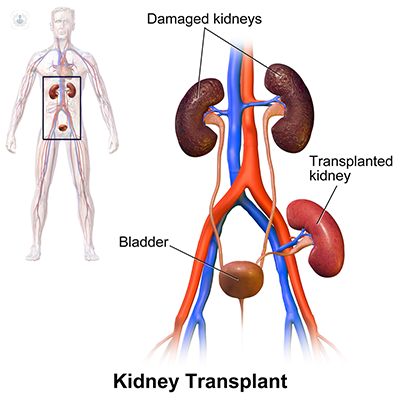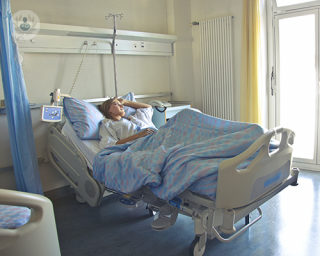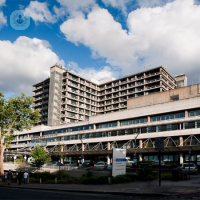What is a kidney transplant?
A kidney transplant is an operation that involves placing a healthy kidney in a person with kidney failure. To do so a kidney donated by a healthy individual is required. This can either come from a living donor, related or not with the patient, or from a deceased person.

When are kidney transplantations needed?
This treatment is indicated for patients suffering from kidney disease who rely on dialysis to survive. The kidneys are responsible for filter waste and toxins, such as urea from the bloodstream. When your kidneys fail, these waste products and toxins remain at dangerous levels in your bloodstream, which can raise blood pressure and result in kidney failure. People with end-stage kidney disease often choose kidney transplantation over lifetime dialysis use because there are several benefits:
- Better quality of life
- Better life expectation
- Fewer dietary restrictions
However, some patients with kidney failure are not suitable for kidney transplantation. For example, if they are very old, have heart disease, have alcoholism or drug addiction, or are impaired mentally. It is important that patients who have a kidney transplantation are compos mentis enough to be able to take essential anti-rejection medications following the transplant.
How is a kidney transplantation carried out?
When you receive a transplanted kidney, your own kidneys are not removed, unless medically required. Kidney transplantation requires sedation with general anaesthesia to ensure that you are not aware during the operation and feel no pain. The surgeon makes an incision in your abdomen and places the donated kidney into the lower abdomen.
Next, the blood vessels of the donated kidney are connected to blood vessels in the lower abdomen, usually a vessel just above one of the legs. The donated kidney’s ureter is then connected to your bladder. This surgery takes up to four hours. The transplanted kidney begins to produce urine as soon as the blood begins to flow and performs the same function as the kidney that was deficient so that dialysis treatment can be suspended.
Preparation for a kidney transplant:
Once the medical specialist refers the patient to a transplant centre, a team will evaluate and examine them to verify that they meet the requirements for a kidney transplant. The patient must undergo various tests such as blood typing and tissue typing, heart tests and tests to check for any infections.
Once it is indicated that the patient meets all the requirements, they will be put on a waiting list. In the meantime, most people waiting for a kidney transplant undergo dialysis treatment. While the patient is on the waiting list it is important not to smoke or consume alcohol. In addition, you must maintain the weight recommended by the medical specialist following the diet indicated. It is also important to take any medication prescribed by the doctor.
An alternative to waiting for a kidney donation from a deceased donor is to be matched with a willing living kidney donor. Often this can be a family member, as they are more likely to be compatible.
Aftercare:
Some pain is expected after the transplantation, and you should be able to return home after a week. During this time, you will be closely monitored to ensure the new kidney is working. Most patients are able to return to work and normal activities 3-8 weeks after the transplantation. The operation is technically simple and after it, the patient can lead a normal life. You will need, however, to take medication for the rest of your life to prevent your body from rejecting the new kidney (these are called immunosuppressants).
11-13-2012 08-29-2023Kidney transplantation
What is a kidney transplant?
A kidney transplant is an operation that involves placing a healthy kidney in a person with kidney failure. To do so a kidney donated by a healthy individual is required. This can either come from a living donor, related or not with the patient, or from a deceased person.

When are kidney transplantations needed?
This treatment is indicated for patients suffering from kidney disease who rely on dialysis to survive. The kidneys are responsible for filter waste and toxins, such as urea from the bloodstream. When your kidneys fail, these waste products and toxins remain at dangerous levels in your bloodstream, which can raise blood pressure and result in kidney failure. People with end-stage kidney disease often choose kidney transplantation over lifetime dialysis use because there are several benefits:
- Better quality of life
- Better life expectation
- Fewer dietary restrictions
However, some patients with kidney failure are not suitable for kidney transplantation. For example, if they are very old, have heart disease, have alcoholism or drug addiction, or are impaired mentally. It is important that patients who have a kidney transplantation are compos mentis enough to be able to take essential anti-rejection medications following the transplant.
How is a kidney transplantation carried out?
When you receive a transplanted kidney, your own kidneys are not removed, unless medically required. Kidney transplantation requires sedation with general anaesthesia to ensure that you are not aware during the operation and feel no pain. The surgeon makes an incision in your abdomen and places the donated kidney into the lower abdomen.
Next, the blood vessels of the donated kidney are connected to blood vessels in the lower abdomen, usually a vessel just above one of the legs. The donated kidney’s ureter is then connected to your bladder. This surgery takes up to four hours. The transplanted kidney begins to produce urine as soon as the blood begins to flow and performs the same function as the kidney that was deficient so that dialysis treatment can be suspended.
Preparation for a kidney transplant:
Once the medical specialist refers the patient to a transplant centre, a team will evaluate and examine them to verify that they meet the requirements for a kidney transplant. The patient must undergo various tests such as blood typing and tissue typing, heart tests and tests to check for any infections.
Once it is indicated that the patient meets all the requirements, they will be put on a waiting list. In the meantime, most people waiting for a kidney transplant undergo dialysis treatment. While the patient is on the waiting list it is important not to smoke or consume alcohol. In addition, you must maintain the weight recommended by the medical specialist following the diet indicated. It is also important to take any medication prescribed by the doctor.
An alternative to waiting for a kidney donation from a deceased donor is to be matched with a willing living kidney donor. Often this can be a family member, as they are more likely to be compatible.
Aftercare:
Some pain is expected after the transplantation, and you should be able to return home after a week. During this time, you will be closely monitored to ensure the new kidney is working. Most patients are able to return to work and normal activities 3-8 weeks after the transplantation. The operation is technically simple and after it, the patient can lead a normal life. You will need, however, to take medication for the rest of your life to prevent your body from rejecting the new kidney (these are called immunosuppressants).


Kidney transplant: how are donors and recipients matched?
By Dr David Game
2024-12-21
Kidneys are the most commonly donated organ around the world, and every year, thousands of people give one of theirs to either a friend, relative or someone they don’t know. For a successful kidney transplant to go underway, donors and recipients must have compatible blood types - but that doesn’t always mean they need to have the same blood type. Dr David Game, a leading nephrologist from London, explains more. See more


Renal failure: dialysis vs. kidney transplant
By Dr Andrew Palmer
2024-12-20
Renal failure is a potentially life-threatening consequence of long-term kidney disease. When the kidneys fail, there are two key treatments to save the patient and keep their blood filtered. Dr Andrew Palmer explains the pros and cons of dialysis and kidney transplants. See more


COVID and kidney disease treatment: how kidney clinics have adapted
By Professor Liz Lightstone
2024-12-16
Kidney disease patients are facing new challenges due to the coronavirus COVID-19. Kidney clinics are consistently adapting to ensure patient safety is at the heart of all decisions and they are continuing treatment where possible. Professor Liz Lightstone clarifies how the virus affects the kidneys, highlights the importance of attending your appointments, how dialysis and transplants have been impacted and more. See more
Experts in Kidney transplantation
-
Dr Ravi Rajakariar
NephrologyExpert in:
- Kidney transplantation
- Hypertension (high blood pressure)
- Diabetic nephropathy
- Dialysis
- Nephropathy (Kidney disease)
- Lupus
-
Dr Andrew Palmer
NephrologyExpert in:
- Chronic kidney disease
- Nephropathy (Kidney disease)
- Urinary tract infection
- Acute kidney injury (AKI)
- Dialysis
- Kidney transplantation
-
Dr David Game
NephrologyExpert in:
- Kidney transplantation
- Chronic kidney disease
- Dialysis
- Hypertension (high blood pressure)
- Acute kidney injury (AKI)
- Kidney stones
-
Dr James Pattison
NephrologyExpert in:
- Proteinuria (protein in the urine)
- Chronic kidney disease
- Urinary tract infection
- Kidney transplantation
- Diabetic nephropathy
- Haematuria (blood in the urine)
-
Mr Atul Bagul
SurgeryExpert in:
- Endocrine Surgery
- Kidney transplantation
- Minimal access surgery (keyhole surgery)
- Parathyroid gland surgery
- Laparoscopic hernia surgery
- Cholecystectomy
- See all

The Royal Free Hospital
The Royal Free Hospital
Pond Street, Hampstead. NW3 2QG
No existe teléfono en el centro.
By using the telephone number provided by TOP DOCTORS, you automatically agree to let us use your phone number for statistical and commercial purposes. For further information, read our Privacy Policy
Top Doctors

The Blackheath Hospital - part of Circle Health Group
The Blackheath Hospital - part of Circle Health Group
40-42 Lee Terrace, Blackheath, London SE3 9UD
No existe teléfono en el centro.
By using the telephone number provided by TOP DOCTORS, you automatically agree to let us use your phone number for statistical and commercial purposes. For further information, read our Privacy Policy
Top Doctors

London Bridge Hospital - part of HCA Healthcare
London Bridge Hospital - part of HCA Healthcare
27 Tooley St
No existe teléfono en el centro.
By using the telephone number provided by TOP DOCTORS, you automatically agree to let us use your phone number for statistical and commercial purposes. For further information, read our Privacy Policy
Top Doctors
-
The Royal Free Hospital
Pond Street, Hampstead. NW3 2QG, Central LondonExpert in:
- General Surgery
- Orthopaedic surgery
- Robotic Surgery
- Dermatology
- Obstetrics and Gynaecology
- Paediatrics
-
The Blackheath Hospital - part of Circle Health Group
40-42 Lee Terrace, Blackheath, London SE3 9UD, East LondonExpert in:
- Vascular Surgery
- Cardiology
- Bariatric Surgery
- Colorectal surgery
- Endocrine Surgery
- General Surgery
-
London Bridge Hospital - part of HCA Healthcare
27 Tooley St, Central LondonExpert in:
- 24-hour service
- Cardiology
- Minimal access surgery (keyhole surgery)
- Orthopaedic surgery
- Cardiovascular disease
- Gastroenterology
- See all
- Most viewed diseases, medical tests, and treatments
- Alzheimer's disease
- Chronic headache
- Fertility preservation
- Female infertility
- Undescended testicle (Cryptorchidism)
- Autoimmune diseases
- Joint pain
- Nutrition
- Testicular ultrasound
- Abdominal pain







